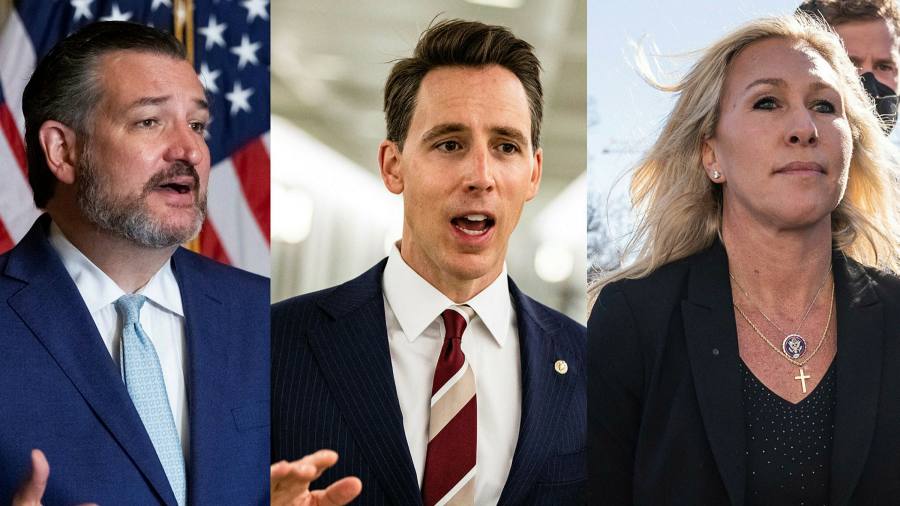[ad_1]
Republicans loyal to Donald Trump raised record sums of money in the first three months of this year, even as US corporations said they would pause or stop political giving in the wake of the January 6 siege on the US Capitol.
The latest filings from the Federal Election Commission show Republican members of Congress — including Missouri senator Josh Hawley, Texas senator Ted Cruz and Georgia congresswoman Marjorie Taylor Greene — raised millions of dollars in campaign contributions in the first quarter, driven in large part by small-dollar donations.
Hawley brought in more than $3m in the three months ending March 31, compared to some $120,000 in the first quarter of last year. Cruz raised $3.6m, compared to the $1.6m he raked in at the same time last year. Neither senator is up for re-election until 2024.
At the same time, Taylor Greene, the representative from Georgia who was ejected from her congressional committee assignments in February over her endorsement of conspiracy theories, raised $3.2m in the first quarter — a staggering sum for a first-term congresswoman.
Matt Gaetz, the Republican congressman from Florida under investigation for alleged involvement in a child sex-trafficking ring, brought in $1.8m. Jim Jordan, the Ohio congressman and another vocal Trump ally, brought in $2.1m — about three times what he raised in the first quarter of last year.
$1.5m
the amount raised in the first quarter by Liz Cheney, the Wyoming congresswoman who voted to impeach Donald Trump over his role in the January 6 riots
Meanwhile, Sarah Huckabee Sanders, Trump’s former press secretary who is now running for governor of Arkansas, said she had raised $4.8m in the first quarter, more than any candidate in the state’s history. About three-quarters of the donations came from out of state, according to her campaign. Huckabee Sanders was the first politician Trump endorsed through his “Save America PAC†after he left office.
The figures underscore the enduring enthusiasm of Trump’s supporter base and the Republican grassroots. It also highlights the increasing power of small-dollar donors at a time when corporations have withheld political spending over the US Capitol attacks, which interrupted the certification of Joe Biden’s electoral college victory and left five people dead.
Many of America’s largest companies — including Facebook, Microsoft and JPMorgan Chase, as well as the US Chamber of Commerce, a big lobby group — said they would pull or review political donations in response to the January 6 riots, which were led by Trump supporters.
Several companies specifically said they would not give to Republicans who opposed the certification of Biden’s presidential win, although a few have broken their pledges.
But the latest filings show that small-dollar donations from individuals, many made online through the Republican party’s WinRed platform, have more than made up the gap for GOP candidates, especially those loyal to the former president. Hawley, Cruz, Greene, Gaetz and Jordan all voted against certifying Biden’s electoral college victory.

The filings also signal how the amount of money in US politics continues to trend upward, even in a year with no major elections on the calendar. The next big political event in the US will be next year’s midterm elections, when all of the 435 seats in the House of Representatives, a third of the 100-member Senate and a spate of governor’s mansions will be up for grabs.
At the same time, the latest FEC filings show that a small number of Trump’s most prominent critics from within his own party were able to fundraise off the back of their opposition to the former president.
Liz Cheney, the Republican congresswoman from Wyoming who was the most senior GOP House member to vote to impeach Trump over his role in the January 6 riots, raked in more than $1.5m in the first quarter. Adam Kinzinger, a Republican from Illinois who also voted to impeach and has set up a political action committee to raise funds for anti-Trump Republican candidates, brought in $1.1m in the first three months of the year, including transfers from other Republican fundraising committees.
However, Cheney and Kinzinger were among just a handful of anti-Trump Republicans who bucked the trend of more muted donations for those who have shown less fealty to the former president, including the seven GOP senators who voted to convict him at his impeachment trial.
Lisa Murkowski of Alaska, who is up for re-election next year, raised almost $379,000 in the first quarter, while Ben Sasse of Nebraska, who will not face re-election until 2026, raised just under $130,000. Mitt Romney of Utah raked in about $75,000.
Taken as a whole, the first-quarter fundraising numbers put next year’s midterms on track to be among the most expensive congressional races to date, and provide early signs that Republicans are catching up with Democrats when it comes to harnessing the power of small-dollar donors through WinRed. Democrats have raked in huge sums in recent election cycles through their own online fundraising platform, ActBlue.
The latest FEC filings show Democrats continued to raise large numbers of campaign contributions in the first quarter of this year.
Raphael Warnock, the Democratic senator from Georgia who won one of two hotly contested Senate run-offs in the southern US state in January, will be up for re-election in next year’s midterms because he won his seat in a special election. According to the latest filings, he raised more than $4.5m in the period between January 26 and March 31.
Mark Kelly, the Democratic senator from Arizona, another key swing state, also won a special election in last year’s cycle and will therefore defend his seat next year. Kelly reported receipts of more than $4.4m in the first quarter.
[ad_2]
Source link





